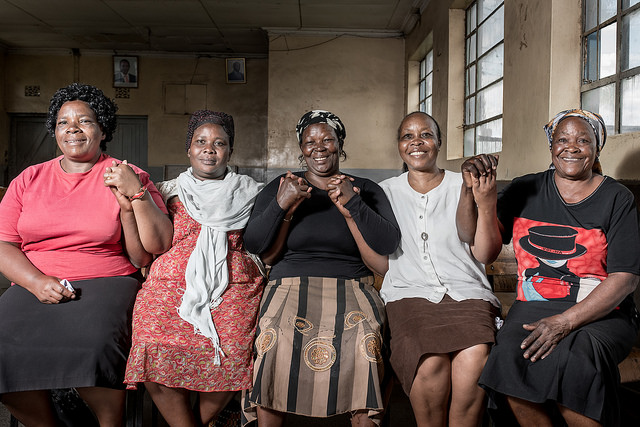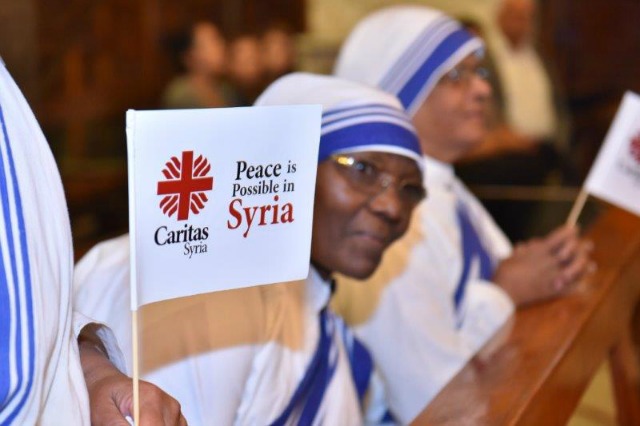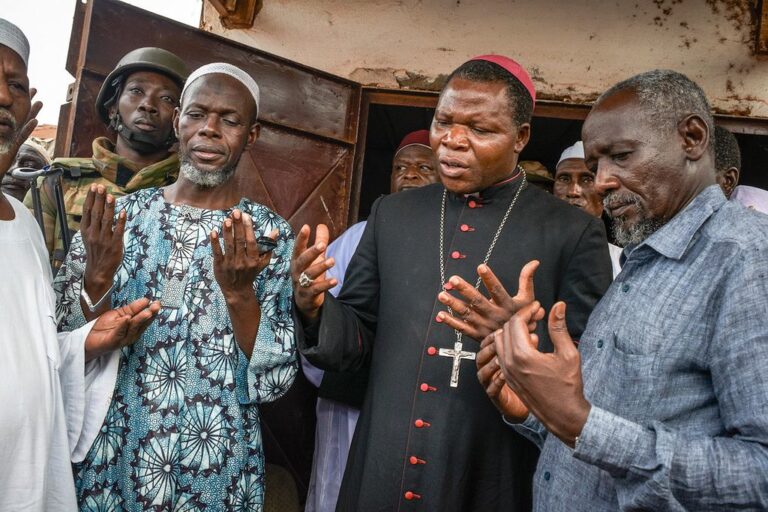The International Day for Peace is an important occasion for humanity to uphold peace as a unique value and to express unconditional commitment to peace above all differences.
Pope Francis said that “every war is a form of fratricide that destroys the human family’s innate vocation to brotherhood.” In line with these words of the Holy Father, Caritas Internationalis believes in peace as a culture that needs to be nurtured, shared, and lived at all levels of society, from local communities to the political level. Caritas is committed to building peace through building communities that live their fraternity through dialogue and sharing.

Caritas peacebuilding project in Kenya. Photo by Trocaire
“Development is the new name of peace.”
Caritas also found profound inspiration in Paul VI’s encyclical Populorum Progressio, where the Pontiff stated that “development is the new name of peace”. Such a call has encouraged Caritas’ work to build a community of fraternity, dialogue and sharing in order to effectively fight against poverty and deep social inequality.
Unfortunately, our humanity today continues to witness millions of people living in dire conditions due to war and violence, which prevent them from living their human condition in dignity. Millions are dying due to the absence of peace, due to war and violence the causes of which are to be found in selfishness, greed, corruption, religious and ethnic discrimination and also the illegal exploitation of natural resources. The memory of the past must lead us to a conversion and to aspire for a world where peace and harmony will contribute to integral human development.

Peace event for Syria. Photo by Caritas Syria
At a time when COVID-19 revealed to all of us the fragility and vulnerability of human existence and brought the whole of humanity together in solidarity to combat the propagation of the virus, we need to stand together in order to fight against all forms of division, all temptation of hatred and – as Pope Francis repeatedly said – act against “mistrust and fear that weaken relationships and increase the risk of violence”.
Putting human person above interests
People at the grassroots aspire to peace and harmony and want to live their life in dignity. Caritas responds to these aspiration as a priority, addressing the root causes of conflicts and violence through conflict prevention, mediation and peace-building, and accompanying, caring for and giving voice to vulnerable people living in crisis areas and difficult social environments.
In the Kachin and Northern Shan State, Caritas Myanmar is carrying out a Durable Peace Program with internally-displaced people, conflict affected villages and host communities, women, youth and religious leaders in close collaboration with the Church. In Mindanao, Philippines, Caritas and the local Church are working for a peaceful solution in a region where violence prevails. In Pakistan, Caritas and the local Church work together to promote peace and harmony among communities through small development projects. In Central African Republic, the Archbishop of Bangui, along with the Imam and the national protestant church leader, was at the forefront in encouraging warring factions to work for peace and reconciliation. In Columbia, Caritas is building the resilience of vulnerable communities to the risks of existing and new violence and is strengthening local development processes for a non-violent transformation of conflicts through people’s participation and empowerment. These are just a few of the programmes that throughout the world are implemented by Caritas to promote peace, harmony and reconciliation.

Archbishop Dieudonné Nzapalainga of Bangui joins Muslims in prayer for an end to the crisis in the Central African Republic. Photo by Sam Phelps for Catholic Relief Services.
Peace cannot be attained without the courageous selfless act of putting the human person and the human condition above any other vested interests. On this International Day for Peace, Caritas Internationalis reiterates its call:
-
stop the war and violence all over the world and especially in the Middle East and promote much-needed dialogue to find a political solution to all the problems. Violence and killing will only engender more hatred;
-
to lift the sanctions on Syria, as it is clear that they do not help promoting peace, but rather aggravate the conflict and are detrimental to peace. Lifting the sanctions may also encourage political leaders to get to the negotiation table;
-
to make every effort and to implement every initiative that can lead to peace in the areas of conflict, to ensure that international aid for development gives important attention to building peace and reconciliation at the grassroots level in order to build community-centred peace and harmony. This includes creating opportunities for education and jobs, in particular for young people at risk of being recruited by armed groups and militias;
-
to support the effort of religious leaders and faith-based communities engaged in promoting interreligious dialogue.
